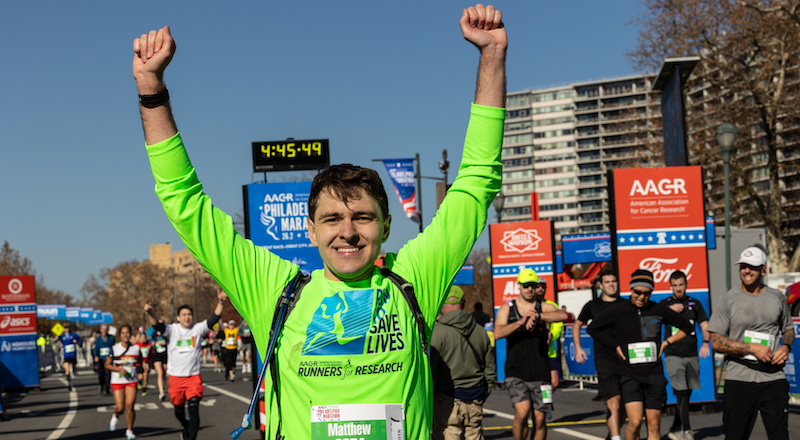
During the pandemic, Matthew Cleaveland, a doctoral candidate at the Penn Research in Embedded Computing and Integrated Systems Engineering (PRECISE) Center, took up running to get outside and boost his health. He spent four months training for his first marathon; two weeks before race day, he faced a major setback.
Cleaveland was diagnosed with cancer and needed immediate surgery. Although the procedure would take place four days before the race, and his doctor said there was no way Cleaveland could run it as planned, Cleaveland was determined to cross the finish line in his own way.
“I ended up running a marathon the week before the race; the first 18 miles were by myself, with friends showing up at various points over the final eight miles,” says Cleaveland, who now is in the final year of his doctoral studies. “So my first marathon was run mostly by myself a week before race day with the specter of cancer looming over me. The moment my watch read 26.2 miles, I knew I was going to run in that same marathon the next year. Cancer had tried to steal that from me, and I wasn’t going to let that happen.”
Since cancer tried to steal running from me, with every mile I could feel it getting more and more owned. I knew that it would be absolutely seething when I crossed the finish line of the 2023 Philly Marathon.
Matthew Cleaveland, PRECISE Center
In her best-selling book “Grit,” Penn professor Angela Duckworth describes this key quality of highly successful individuals as a combination of “passion and perseverance.” During his time at Penn Engineering, Cleaveland has displayed these qualities on and off the race course.
Cleaveland, who is advised by PRECISE Center Director Insup Lee and UPS Foundation Professor of Transportation George J. Pappas, develops methods for determining the behaviors of autonomous systems, which must weigh the probabilities of various events to navigate an uncertain future.
Cleaveland has had a passion for probabilities since he was 10, when his father took him to an academic conference talk about simple Markov chains, mathematical tools used to represent sequences of events where the likelihood of each event depends only on the preceding event.
“During that talk I realized that all of the probabilities on the picture that was the Markov Chain summed to one,” says Cleaveland, who pictured himself pursuing paleontology before that fateful conference trip. “So in hindsight that was my first foray into probability theory. So 10-year-old me would be happy to see that I’ve gone on to use extensions of Markov chains in my research.”
Cleaveland went on to study math and electrical and computer engineering at Duke before joining Penn Engineering in 2018.
“I liked the automata and finite-state machines that I learned about in an undergrad computer architecture course,” Cleaveland says, referring to a course about theoretical representations of machines, governed by probabilities, taught by Benjamin Lee, who is now an affiliated professor in the PRECISE Center. “So I wanted to study a field that used them, which formal methods does. I also like the logical reasoning that underlies a lot of the automata theory.”
In one of his recent research projects, Cleaveland worked to develop a method of safely planning trajectories for machines in environments with moving obstacles. The method uses a statistical tool called conformal prediction, along with standard trajectory prediction neural networks, to guess the future locations of the moving obstacles.
“One major application of this work,” says Cleaveland, “is for self-driving cars operating in pedestrian-filled environments. Our method can be used on top of any existing method for predicting the future behaviors of the pedestrians.”
He has continued to run competitively, finishing the 2022 and 2023 Philadelphia Marathons, several half marathons and the 2023 Broad Street Run. “Since cancer tried to steal running from me, with every mile I could feel it getting more and more owned,” Cleaveland says. “I knew that it would be absolutely seething when I crossed the finish line of the 2023 Philly Marathon.”
Cleaveland will soon cross another finish line: The completion of his Ph.D. program.
“Oftentimes you do not get to hear people’s struggles behind their highlight reel. In addition to having grit, there is yet another quality called courage when one allows himself or herself to be seen.” says Lee, Cleaveland’s co-advisor. “Matthew will be joining MIT Lincoln Laboratory after he graduates. I am so proud of Matt’s journey and cannot wait to see how he will conquer the world now that he is cancer-free.”
